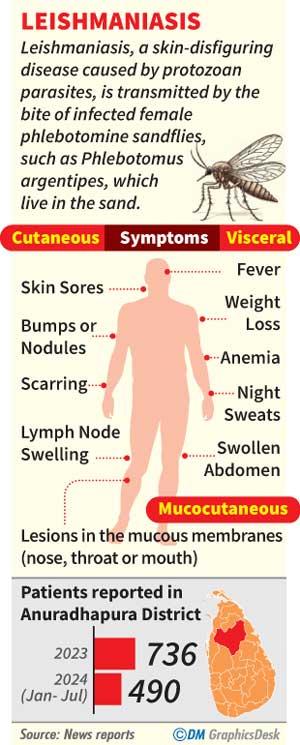Reply To:
Name - Reply Comment
 By Dayaratne Embogama - Anuradhapura
By Dayaratne Embogama - Anuradhapura
The most number of Leishmaniasis patients in the country have been reported from the Anuradhapura District, a medical expert said.
Senior Medical Officer of the Anuradhapura Teaching Hospital Dr. Hema Weerakoon said Leishmaniasis caused by a Leishmania parasite identified as Phlebotomus Argentipes living in the sand is a skin-disfiguring disease. She said patients had been reported mostly from Anuradhapura, Polonnaruwa, Hambantota, Matara and Kurunegala Districts. She said several patients had been reported from Vavuniya and Matale Districts.
She said 736 Leishmaniasis patients had been reported in Anuradhapura District in 2023 and 490 from January to July, this year. In the district, cases have mostly been reported from areas such as Talawa, Mihintale, Padaviya, Medawachchiya, Galenbindunuwewa, Ipalogama, Nochchiyagama and Thambuttegama.
Leishmaniasis is caused by protozoan parasites which are transmitted by the bite of infected female phlebotomine sandflies. “This sandfly is found mostly in dry climatic areas. It is a minute creature about four millimetres long and of light brown colour. It lives in shrubs, near pools, and in grass. It stings human beings and animals at night. Red spots infecting the skin, particularly in the face and limbs and areas that are not covered with cloth, is the initial symptom. These red spots develop into a rash without scratching. A patient who contracted this disease would obtain proper treatment at a dermatology clinic without resorting to self-medication by applying lotions, and ointments and taking tablets.
She said a Dermatology Clinic was opened to provide treatment to the Leishmaniasis patients in view of the increasing rate of patients.